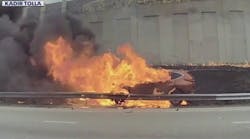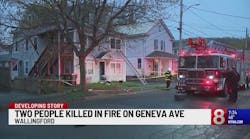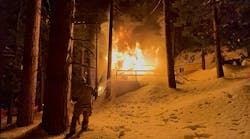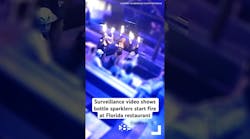One of the key challenges has been the paradigm shift of viewing fire prevention as a fundamental element and key function of fire protection services rather than a function that simply supports the line.
In our last article we ended it discussing the importance of customer service, enhancing professional relationships and maintaining focus on our job. We also discussed the justification of our job, and the importance of our mission to the safety of firefighters and the public through the performance of our work. All of these items are important to remember albeit difficult sometimes, particularly when we are downtrodden and discouraged.
History
We have worked so hard, year after year, particularly after the publication of America Burning, to enhance and foster a holistic fire prevention attitude and elevate the status of its importance. One of the key challenges has been the paradigm shift of viewing fire prevention as a fundamental element and key function of fire protection services rather than a function that simply supports the line.
In the last article we spoke of supporting the line, which is important, however, we must emphasize that fire prevention should never be viewed as a support function of the line. Our professional and career objective should be to mitigate and prevent hostile fires so that emergency suppression functions are unnecessary. Obviously for a number of reasons (principally economics) this will not be achievable in our communities in the near future; however, for those nay Sayers we would highlight the National Aeronautics and Space Administration's (NASA) emphasis on fire prevention and mitigation.
At the start of the Apollo program, a significant fire event occurred which cost the lives of three astronauts. This resulted in wholesale changes in design and processes regarding fire safety. As a result, we have not seen a significant event related to a hostile fire in a program related shuttle or space station. The reason is because of the dedicated and focused work on fire prevention practices and engineering. It is impossible to call an earthly fire department to respond to outer space to put out a fire, therefore, NASA designs and programs fire out of its mission. Given the proportional money, we could likely eliminate the same threat in our communities. However, that money will not come and therefore we must utilize a balanced approach, a "systems approach" to fire protection and prevention.
The unfortunate part of this is that many community leaders and fire chiefs do not understand the relationship and impact dedicated fire prevention efforts have had on the fire problem. They will typically turn to the statistics that show a dramatic downturn in fire incident rates, voicing their perception that based on the numbers; there is no significant fire problem. This forces and justifies the question of why they should spend so much on prevention efforts when there is no issue to prevent? The reality is, these same people have forgotten or maybe never knew what America's fire problem was like before the landmark efforts were made to correct the most serious fire experience in the industrialized world during that time. The frustrating part is that awareness and education of the need for these positive achievements will take time, probably more than we have available before cuts must occur.
Focus and Mission
Given that cuts and reductions will likely occur, how do we continue to pursue the prevention and mitigation mission? What is reality? How do we prioritize tasks to identify those to eliminate? How do we deal with morale and attitudes? How do we prepare for the latent effects? Most important though, how do we strategize efforts in the future to minimize or eliminate these cuts and eliminations of fire prevention functions?
Keep an eye on the ball
Most of us have sworn an oath. That oath is to protect the citizens of our community. To do so requires dedication and focus, not on how sad cuts and position eliminations are, but on what is important: Finding fire hazards and correcting them, providing timely professional information on how to mitigate fire hazards, selling fire prevention code requirements and providing good customer care.
Listen And Be thoughtful
Remember that you work for the public. If you think your policy makers are uninformed, you need to reflect on what you or your department has failed to do to make them aware and informed. If you think your chief doesn't understand the importance of fire prevention issues, you need to think about why he or she has that opinion. What have you done to make them aware of or to involve them in the process? If the public chooses emergency response over fire prevention functions, why is that? Maybe it is the best choice from a list of bad ones.
Emergency responders provide a host of functions and can perform a variety of services. An inspector, boiled down to doing their job, still costs someone (businesses) money. No matter how fancy you dress that fact up, it still is not that attractive. The fact is, those of us in fire prevention are not generally viewed as a charter member of the Hero Division. Don't view that offensively, just reflect and understand the overall perceptions and reality of various job functions. Another thing to consider is that sometimes a manager or chief's choices for cuts come from a solution that stinks, another that stinks, and one that really stinks. How would you pick one of those?
Prioritize Your Tasks
This is tough. What is your local fire experience? What is your biggest local fire problem? Which are your highest risk occupancies (life safety)? Target the occupancies that make you most unsettled with regard to possible fire threat. Make a list and inspect those. Make a list of where you are having your highest number of fires, fire deaths and injuries. Inspect these. Put resource toward making sure that new buildings or processes are code compliant when they get their final inspections. Being new and assuming they start out right, these occupancies can go a while with no intervention just because people will try to keep things new...for a while.
Who's The Morale Officer Today?
This too is a hard one. We are not sure where this got started, but many folks nowadays seem to want a lot from their bosses. There was an analogy that spoke to people being one of three types: power generators, power sappers or co-generators. The generators are those types of people who constantly allow people to plug-in and pull their power. The sappers are those who need power from others and are constantly seeking the generators to fulfill their power demands. Obviously then, the co-gens are those who provide a balance of power supply and give energy to those who need it sometimes, pull power from others who have extra to give sometimes, but generally, they participate in a balanced state, giving and receiving. Watch for the power sappers because they can drain your battery. Don't provide all the power either because in time that will just make you bitter. Know when to share and when to take and help others understand that too.
Support your staff, encourage them, communicate, communicate, communicate. Don't give them the opportunity to feel sorry for themselves, and don't lie to them about the situation. Take responsibility for giving as much as you are taking. Be accountable to yourself and your staff. Understand and be empathetic that they are scared and nervous about their jobs and the jobs of others. Understand too, that you cannot solve everything and protect everyone. Do your job, make sure your staff does their job and stay busy. Focus on the mission and be supportive. Those that matter will rally around the cause. Those that don't may not have been there for the long haul anyway.
Latency And Strategy
Completely shutting down fire prevention functions won't result in an immediate apocalypse. The good work that was done on prevention and mitigation will last for a while. However, the longer prevention and mitigation functions remain sluggish or dormant, the more severe the outbreak of fire incidence and damage will occur. Careful monitoring of statistics and loss will provide evidence of developing trends and may help predict when efforts must be adjusted to stave off major events. This should be the time we evaluate cause and effect and mitigation and outcome. Establish measurable benchmarks and monitor trends. Communicate these data points frequently and provide anecdotal evidence of process and achievements. Communicate frequently with your Chief, your policy makers and the public. Be objective and provide facts that can regularly be replicated and analyzed. Don't try exaggerate the facts. Those will immediately be suspect and dilute all of your efforts.
Remember, hard times require lots of effort and commitment to hard decisions. Don't spend time trying to control things that are outside your control. That will make you crazy. Be open to opinions, perspectives and other's perceptions. Defend the faith, but understand there are a lot of competing factors in troubled financial times. Try not to take things personal, and help your staff from feeling attacked. Remember that the crummy decisions are likely coming from a crummy list of choices. Presume good will and focus on the mission. There are a lot of people who rely on your expertise, your training and your ability to sell prevention. We know how important it is. Lets do a better job of helping others understand what we know.
Related Links
BRETT LACEY, a Firehouse.com Contributing Editor, is the Fire Marshal for the Colorado Springs, CO, Fire Department and a professional engineer. He has over 27 years in the fire service and has served on various technical committees including NFPA 1031, IFSTA committee for Inspection practices, and Fire Detection and Suppression Systems and the Colorado Fire Marshal's Association Code Committee. PAUL VALENTINE, a Firehouse.com Contributing Editor, is the Fire Marshal for the Mount Prospect, IL, Fire Department and formerly served as their fire protection engineer. He has a Bachelor of Science Degree in Fire Protection and Safety Engineering Technology from Oklahoma State University and a Master of Science Degree in Management and Organizational Behavior from Benedictine University and is a graduate from the National Fire Academy's Executive Fire Officer Program. Brett and Paul co-authored Fire Prevention Applications, published by Fire Protection Publications. They also presented a webcast titled Fire Prevention Applications on Firehouse TrainingLIVE. To read their complete biographies and view their archived articles, click here. You can reach Paul by e-mail at: [email protected].





